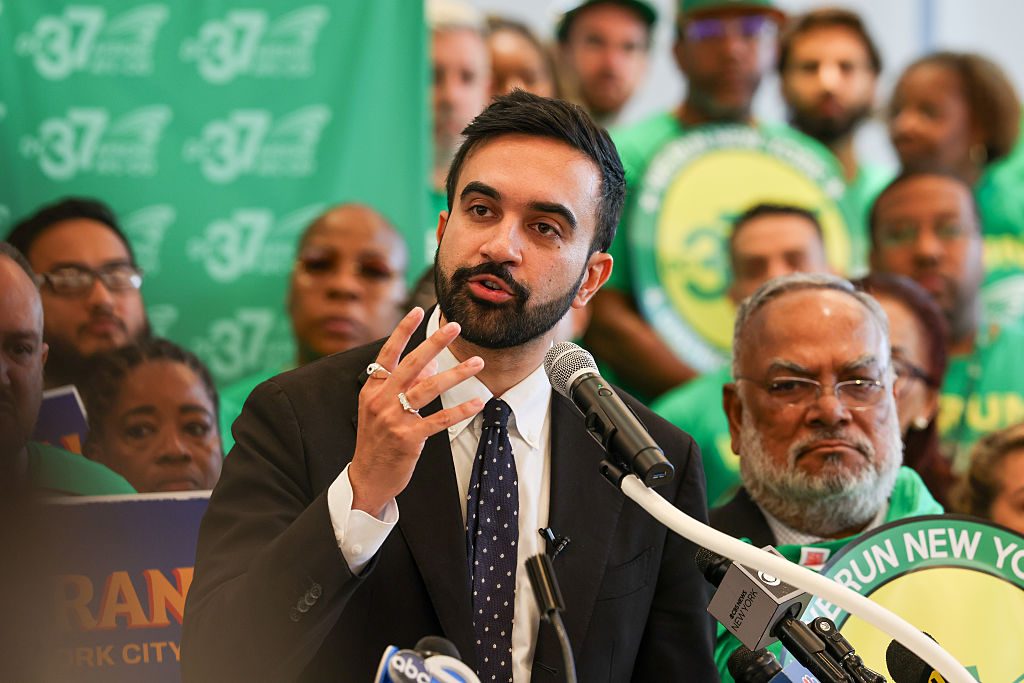Every mayor of New York depends on a winning coalition. A recent poll suggests that Democratic frontrunner Zohran Mamdani has consolidated support among a majority of foreign-born voters and religious groups other than Christians and Jews. His meteoric rise tells the story of a new electoral alliance, built on a constituency that is socially conservative in many respects yet has found common cause with the hard-Left: Muslim New Yorkers.
In 2016, 768,000 Muslims lived in New York City. Less than a decade later, that figure has risen to about one million, placing the city’s Muslim population roughly on par with its estimated 960,000 Jews.
With his Muslim, Ugandan-Indian immigrant background, Mamdani understood this dynamic better than his rivals. Despite a thin record of accomplishment over his five years as an assemblyman, he became known for a 15-day hunger strike to secure debt relief for taxi drivers, many of them Muslim. He expressly invoked his faith as he broke the strike, timed to break the Ramadan fast.
New York has long been prone to ethnic voting. Mamdani’s appeal among South Asians and other Muslim groups likely owes more to shared heritage and identity than to his socialism or radical positions such as the “full decarceration” of New York State. If elected, he would be the first South Asian and the first Muslim mayor — a prospect not lost on many foreign-born voters.
During the primary, Mamdani and his allies in the Democratic Socialists of America group registered and mobilised South Asian voters, especially young Muslims, whose enthusiasm could ripple through their families and communities. His campaign was the driving force behind the 37,000 new voter registrations in the two weeks before the primary deadline, more than 12 times the comparable 2021 figure. Many came from heavily South Asian neighbourhoods such as Jackson Heights, Queens, and Bay Ridge, Brooklyn. One analysis revealed that voters with surnames associated with majority-Muslim countries were far likelier to vote in 2025 than in 2021.
While it may seem unusual that a leading mayoral candidate would devote so much attention to the Middle East, the focus reflects the convictions of his coalition. There’s little reason to doubt that Mamdani’s anti-Zionism springs from personal conviction, but his base also explains why he hasn’t needed to moderate his message. He’s repeatedly called Israel’s actions in Gaza “genocide” and “apartheid”, and has vowed to arrest Benjamin Netanyahu if the Israeli Prime Minister visits the city.
In last week’s debate, Mamdani recounted conversations with Jewish leaders who described the terror provoked by the chant “globalise the intifada”. That, apparently, wasn’t persuasive enough. He declined to condemn the phrase, saying only that he would “discourage” its use.
Mamdani has often deflected criticism of his rhetoric against Israel by redirecting it as Islamophobia. This obscures the magnitude of the threat that New York’s Jews uniquely face today. Of the 648 hate-crime complaints in New York City in 2024, 344 (over half) targeted Jews, while 44 were directed at Muslims.
Meanwhile, Mamdani recently beamed for a photo with Imam Siraj Wahhaj, a cleric who, among other things, served as a character witness for the architect of the 1993 World Trade Center bombing. Mamdani’s main rival, former governor Andrew Cuomo, highlighted Wahhaj’s extreme conservatism on social issues, noting that he once invoked the prophet Muhammad to suggest that two gay men found together should be punished with death.
During last week’s debate, Mamdani again attacked Cuomo for not visiting a mosque during the primary campaign, saying: “It took Andrew Cuomo being beaten by a Muslim candidate to set foot in a mosque.” Cuomo has since made up for that by visiting multiple since September. During these visits, he has sought to drive a wedge into Mamdani’s Muslim base by highlighting the assemblyman’s support for decriminalising prostitution and drug possession as inconsistent with Islamic morality. He has also pointedly shared videos of Muslim New Yorkers critical of the Democratic candidate.
But these positions are fully compatible with the beliefs of Mamdani’s other constituency — the Democratic Socialists of America. The group recognises that Muslims now form a powerful voting bloc. Despite starkly different social sensibilities, it’s willing to coexist within the uneasy coalition. Whether that coalition endures under a prospective Mamdani mayoralty — or fractures under the pressures of governing — will define New York’s political future.











Join the discussion
Join like minded readers that support our journalism by becoming a paid subscriber
To join the discussion in the comments, become a paid subscriber.
Join like minded readers that support our journalism, read unlimited articles and enjoy other subscriber-only benefits.
Subscribe